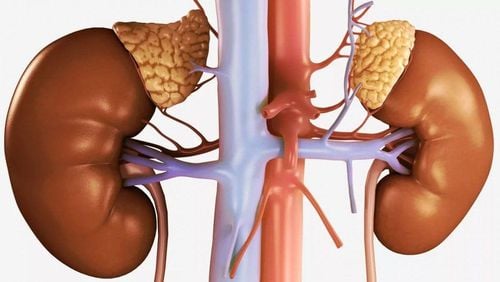This is an automatically translated article.
Cortisol is an important ingredient that helps the body control stress and fear. Both long-term excessive increases or decreases in cortisol have the potential to cause medical conditions.
1. What is Cortisol?
Cortisol is considered as an inbuilt alarm system in the body. It is secreted by the adrenal glands, which work with other organs in the brain to control mood, motivation, and fear.
In addition to providing energy for the process of dealing with crises occurring in life, cortisol also plays an important role in a number of body activities such as:
Managing how the body uses carbohydrates and fats and protein Reduce inflammatory responses Regulates blood pressure Raises blood sugar (glucose) Controls sleep/wake cycles Boosts energy to help deal with stress and restore balance to the body

Tuyến thượng thận là bộ phận tiết ra Cortisol
2. How to regulate cortisol levels?
The hypothalamus and pituitary gland have the ability to sense whether the level of cortisol in the body is correct or not. If cortisol levels are too low, the brain will create a stimulus response to signal the adrenal glands to increase cortisol secretion.
Cortisol receptors are present in almost every cell in the body. They receive and use hormones in different ways. The need for cortisol also varies from day to day. When cortisol is at an alarming level, the body responds by changing its content or role in organs, mainly in the digestive system, reproductive system, immune system, and even processes. growth.
3. What are the consequences of prolonged stress?
After a state of stress, cortisol levels drop. The cardiovascular system, blood pressure, and other organ systems will return to normal. However, when stress is prolonged, cortisol cannot control all organs, leading to a number of health problems, including:
Anxiety and depression Headaches Cardiovascular disease Mental problems Memory and concentration Digestive problems Difficulty sleeping Weight gain

Stress kéo dài khiến người bệnh dễ bị trầm cảm, mất ngủ
4. How does the body secrete too much cortisol?
Adrenal adenoma or pituitary adenoma are two factors that trigger the body to overproduce cortisol. This can cause Cushing's syndrome with rapid weight gain, easy bruising, muscle weakness, diabetes, and many other health problems.

Cơ thể ra sao khi tiết quá nhiều cortisol gây tăng cân nhanh chóng
5. What happens when the body secretes too little cortisol?
If the body does not produce enough cortisol, it can easily lead to Addison's disease with symptoms that manifest over time:
Skin changes such as dark spots in scars and skin folds Always feeling tired Muscles getting weaker and weaker Diarrhea, nausea, vomiting Loss of appetite and weight loss Low blood pressure In cases where the body does not make enough cortisol, pills such as dexamethasone , hydrocortisone or prednisone may be prescribed to supplement.
Vinmec International General Hospital is the address for examination, treatment and prevention of many diseases. When performing the examination and treatment process at Vinmec, customers will receive an in-depth examination with experienced specialists and modern facilities.
Please dial HOTLINE for more information or register for an appointment HERE. Download MyVinmec app to make appointments faster and to manage your bookings easily.
Reference source: webmd.com













